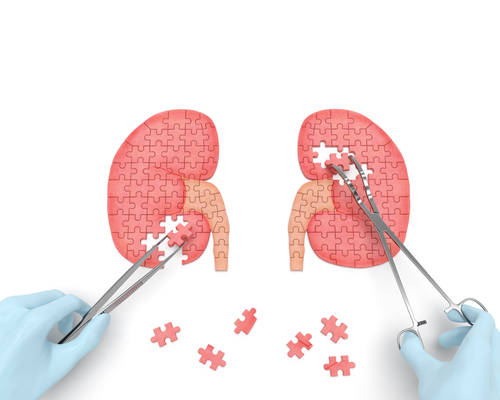Severe Alport Mutations Do Not Affect Kidney Transplant Outcomes, Study Shows

Although the type of genetic mutations causing Alport syndrome influences disease progression and severity, it does not impact patient outcomes or survival chances after a kidney transplant, a study shows.
The study, “Genotype and Outcome After Kidney Transplantation in Alport Syndrome,” was published at the journal Kidney International Reports.
An organ transplant is the best option for Alport patients who develop end-stage renal disease. These people have similar graft and overall survival rates as those with other renal diseases.
But some reports suggest that Alport patients, post-transplant, can develop antibodies against the collagen fibers of the new kidney, and consequently see a return of kidney disease.
There is little information on the prevalence of this complication, or on whether patients’ genetic mutations affect post-transplantation outcomes.
A research team at Université Catholique de Louvain, in Belgium, reviewed the clinical records of 73 patients with genetically confirmed Alport syndrome who underwent kidney transplants between 1971 and 2014.
In 78% of cases, the disease was found to be due to mutation in COL4A5 gene, whereas 11% had mutations in COL4A3, and 7% in COL4A4 gene. These mutations were classified as severe if they led to significant alterations on the encoded protein, or non-severe when only mild alterations resulted. Most of the people studied — 41 patients — had a severe mutation, and the remaining 32 a non-severe mutation.
Patients with severe mutations were found to develop earlier end-stage renal disease, requiring a kidney transplant at an earlier age. Still, survival rates were similar in patients with severe and non-severe mutations, with 89% versus 84% survival at five years, respectively, and 83% versus 75% at up to 20 years post-transplant.
Graft survival, or that of the transplanted organ, was also not affected by the severity of the genetic mutation. Graft survival was of 77% in patients with severe mutations compared to 63% in the non-severe mutations group at five years after transplant, and of 55% versus 50% after 20 years.
“Although severe mutations affect the severity of Alport syndrome, they do not have an impact on patient and graft survival after transplantation,” the researchers stated.
Development of new renal disease in the transplanted kidney due to antibodies-mediated kidney inflammation (anti-GBM glomerulonephritis) was detected in only one patient. He was carrier of a severe COL4A5 mutation and underwent a first kidney transplant at age 18. Six years later he showed signs of renal failure with increased blood creatinine, and elevated blood cells and protein levels in the urine. He lost the transplanted kidney and was given a new one six months later. But autoantibodies-mediated renal disease recurred after three years and with similar clinical presentation, leading to a second graft loss.
“De novo anti-GBM nephritis after transplantation was less frequent than previously reported, occurring in only 1.4% of Alport syndrome patients, and in 2% of males with COL4A5 mutation,” they reported.
The researchers believe that low incidence of graft rejection may be due to improved immunosuppressive therapies, preventing the production of autoantibodies that may target the transplanted organ.
Most cases of graft rejection occur within the first year post-transplant. However, the case reported in this study only occurred after six, which suggests that long-term monitoring of patients is critical to ensure the best outcome.







Leave a comment
Fill in the required fields to post. Your email address will not be published.